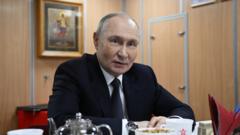In recent remarks, Russian President Vladimir Putin proposed that Ukraine be placed under temporary United Nations administration to facilitate the election of a more "capable" government. This statement appears to challenge the legitimacy of the current Ukrainian leadership, specifically targeting President Volodymyr Zelensky, who is accused of extending his term beyond its constitutional limits amidst ongoing warfare.
The idea has been met with skepticism by Ukraine, which branded it "crazy" and an effort to stall progress towards a peace agreement, as advocated by U.S. President Donald Trump. The U.S. government emphasized that any decision regarding Ukraine's governance is solely up to its people and constitution. As the fourth year of war drags on, negotiations for a ceasefire remain tenuous, particularly following a limited truce in the Black Sea which was quickly followed by Russia's unsatisfactory list of conditions, raising alarm that Moscow aims to obstruct peace talks.
While conversing with the crew of a nuclear submarine in Murmansk, Putin suggested that discussions on a UN-led temporary administration could include the U.S., European allies, and "partners." He argued that a new, legitimate government would then pave the way for peace discussions and documents. However, Ukraine contends that organizing legitimate elections during the chaos of war and while millions of citizens remain displaced is impractical.
Putin's narrative also attempts to erode Zelensky's status as a valid negotiating partner. Criticism arose from Ukraine, asserting these claims are unfounded and countered accusations of ongoing Russian attacks on their own infrastructure. His spokesman later justified the proposal as a response to perceived "loss of control" by Kyiv, insisting Ukrainian forces weren't adhering to leadership orders.
Zelensky's chief of staff Andriy Yermak characterized Putin's statements as deliberate attempts to hinder peace negotiations and prolong conflict. Concurrently, U.S. officials reiterated their stance that Ukraine's governance is solely up to its people. Despite Putin's claims of "strategic initiative" in the conflict, reports indicate that Russia has made minimal territorial advancements.
The remarks from Putin follow a recent meeting wherein Zelensky discussed strategies with European allies, including a proposed reassurance force for Ukraine from France and the UK. The ongoing situation underscores the complex interplay of power, legitimacy, and the hope for peace in a war-torn region.
The idea has been met with skepticism by Ukraine, which branded it "crazy" and an effort to stall progress towards a peace agreement, as advocated by U.S. President Donald Trump. The U.S. government emphasized that any decision regarding Ukraine's governance is solely up to its people and constitution. As the fourth year of war drags on, negotiations for a ceasefire remain tenuous, particularly following a limited truce in the Black Sea which was quickly followed by Russia's unsatisfactory list of conditions, raising alarm that Moscow aims to obstruct peace talks.
While conversing with the crew of a nuclear submarine in Murmansk, Putin suggested that discussions on a UN-led temporary administration could include the U.S., European allies, and "partners." He argued that a new, legitimate government would then pave the way for peace discussions and documents. However, Ukraine contends that organizing legitimate elections during the chaos of war and while millions of citizens remain displaced is impractical.
Putin's narrative also attempts to erode Zelensky's status as a valid negotiating partner. Criticism arose from Ukraine, asserting these claims are unfounded and countered accusations of ongoing Russian attacks on their own infrastructure. His spokesman later justified the proposal as a response to perceived "loss of control" by Kyiv, insisting Ukrainian forces weren't adhering to leadership orders.
Zelensky's chief of staff Andriy Yermak characterized Putin's statements as deliberate attempts to hinder peace negotiations and prolong conflict. Concurrently, U.S. officials reiterated their stance that Ukraine's governance is solely up to its people. Despite Putin's claims of "strategic initiative" in the conflict, reports indicate that Russia has made minimal territorial advancements.
The remarks from Putin follow a recent meeting wherein Zelensky discussed strategies with European allies, including a proposed reassurance force for Ukraine from France and the UK. The ongoing situation underscores the complex interplay of power, legitimacy, and the hope for peace in a war-torn region.



















